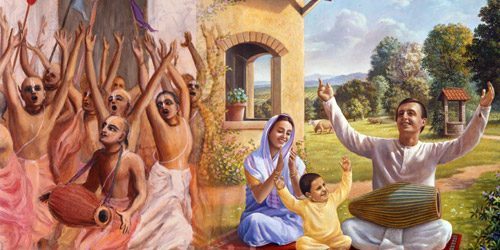Question : What are the responsibilities of an ideal husband and wife, pertaining to household activities in the current generation?
Answer by Romapada Swami :
The Vedic terminology for ideal household life is “Grihastha-Ashrama.” The word “ashrama” means a place or situation conducive for spiritual cultivation. Thus, the primary responsibility in grihastha-ashrama, for every member of the household, is to maintain a favorable atmosphere at home for the collective spiritual progress of the family. With this ultimate goal in mind, the husband and wife should co-operate to execute their respective roles and duties.
The specific duties of a householder are primarily identified in 3 categories: performance of sacrifices, giving in charity, and accepting dependents and caring for them.
In this age, the easiest and recommended process of sacrifice is the *sankirtana yajna*, or organizing and participating in the congregational chanting of Krishna’s Holy Names. The most effective way to achieve this, in practice, is to have a regulated daily program of hearing Srimad Bhagavatam, chanting Hare Krishna and worshiping Krishna at home and seeking the association of saintly devotees whenever possible.
And the householder, recognizing Krishna to be the actual proprietor, should liberally give in charity for the service of the Lord, particularly for the cause of spiritual education in society.
As far as caring for dependents, it is the duty of the grihastha to beget good children and train them in spiritual culture and Krishna consciousness.
Inviting and serving guests, and through this medium sharing one’s spiritual knowledge and culture with others, and particularly seeking the association of saintly devotees whenever possible, is another important duty of the grihastha-ashrama. Srila Prabhupada emphasized this aspect many times in describing ideal husband and wife, because sense-control, charity and sacrifice are all consequential in being so engaged in serving guests. There are many examples of ideal householders in Vedic tradition who selflessly engaged their full energy in serving saintly persons, guests and in fact all members of the community.
The basis of all these is the sankirtana, or the process of hearing and chanting. Through this, Krishna is kept in the center of the household; all other activities are structured around devotion to Him. Both the husband and wife should do their respective parts in arranging the household activities on this basis. Thus, ordinary activities — including occupational duties, economic pursuit, domestic maintenance, raising children, social dealings etc – are all done with a higher purpose, and will not overshadow the real purpose of life.
(For further reference, pls. see BG 16.1-3; SB 1.9.26-27 and Canto 7, Ch 14)
Question: 2. These days, before marriage a woman typically acquires higher education, works in various positions, and thereby spends more time outside home. After marriage although the woman is a housewife, she dislikes the usual household responsibilities that a woman in earlier generations would do without any qualms, such as cooking, taking care of in-laws and taking reasonable advice/instructions from in-laws.
Are these expectations too much from the current generation housewife? Are we going against their wishes? Also, are there suitable ways to convince the housewife to take the correct path? Please advise.
Answer by Romapada Swami:
Varnashrama culture is not in place in this age. Therefore, there is no adequate support structure or training – for any member of the society, including women as well – in executing their prescribed occupational duty.
Rather than nurturing qualities such as humility, dutifulness, service attitude, working for a higher purpose in life, etc, modern education fosters exactly the opposite qualities. In the absence of a higher conception of life and the qualities that go with it, it is indeed stifling to expect women (as much as any individual, in general) to abide by conventional roles and duties that they are not trained for. Without a higher purpose, such duties cannot bring satisfaction.
And yet, giving up these duties leads to spiritual degradation and all its attendant problems!
The situation as described by you is quite realistic and to the point, and the reason behind it is this lack of training and support. The real support, therefore, needs to come from ‘bhagavata-dharma’, i.e. from hearing from self-realized souls.
When there is proper spiritual education, fulfilling engagement and good association, through which women can experience deep shelter and higher taste, then they will happily choose their natural duties and not go for inferior engagements. In the absence of varnashrama society, which naturally provides all of these, it is the duty of the husband (or parents, or any responsible guardian) to arrange for proper association and fulfilling engagement for the women under their care, to fruitfully engage all their social, cultural, and devotional propensities. With this foundation and through the process of hearing from and associating with advanced souls, they will come to understand the spiritual significance behind their apparently routine or humble domestic duties, and thereby find full satisfaction.
As in training children or a disciple or anyone in general, rather than trying to convince them, we have to find the means to give women adequate facilities and support, and wait patiently to see them naturally accept these principles from within their hearts. It is a challenging service in itself, but the basic foundation, as we stated in the beginning, is regular hearing from self-realized souls. You can start here by finding regular opportunities to hear from and cultivate relationship with advanced devotees, and from that everything else follows naturally.







